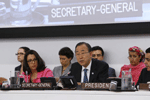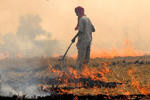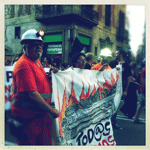Published on Thu, 2012-08-09 12:56
The United Nations is preparing for a post-2015 Development Agenda to replace the Millennium Development Goals, with an advisory panel announced last week and a possible Development Summit in 2015, wrote Martin Khor, executive director of South Centre, in his most recent column for The Star, one of the leading Malaysian newspapers. |
Published on Thu, 2012-08-09 12:54
At least 25 Asian and international civil society organizations are calling to “act swiftly” to avoid “the impending disaster” and to “regain our momentum and defeat the system by targeting the source” of the global environmental crisis. Some of the groups that signed the appeal are the Movement for National Land and Agricultural Reform (Monlar, Sri Lanka), La Via Campesina and Focus on the Global South. |
Published on Wed, 2012-08-08 15:41
Conflicts on water all over the world responds to “the absence of recognized policy mechanisms and public institutions for managing water resources and allocating water in accordance with criteria that can be understood by the public” and can not be settled by market mechanisms, according to Peter Niggli, director of Alliance Sud, focal point of Social Watch in Switzerland. |
Published on Mon, 2012-08-06 13:35
The Canadian Centre for Policy Alternatives' national office have just been moved to Under One Roof Properties, project that unites Ottawa-based progressive organizations with shared office spaces and facilities, aimed to foster an environment of interaction, collaboration and movement for social change. |
Published on Fri, 2012-08-03 15:36
Emerging countries are being affected adversely by the European and US economic situations, according to Martin Khor, executive director of South Centre, in his most recent column for The Star, one of the leading Malaysian newspapers. Rich countries’ demand is falling, as poor countries’ exports. Inflows of capital into developing nations have also slowed down, and a reversal to a new outflow situation may well take place. The lending conditions of banks in emerging economies have also deteriorated, explains Khor. |
SUSCRIBE TO OUR NEWSLETTER







